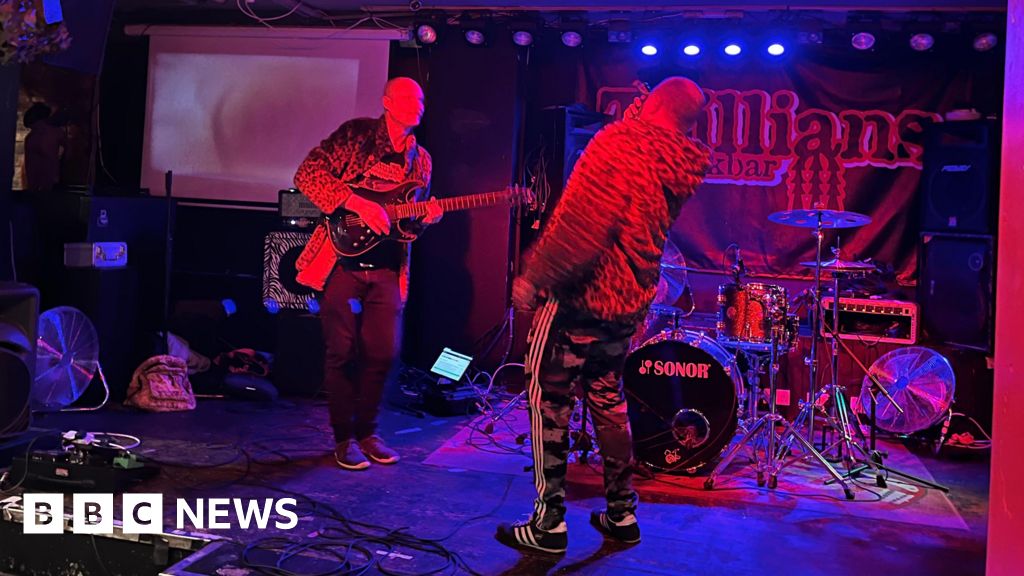- author, david mcmillan
- role, BBC news
Artists and promoters are calling for more support for grassroots music venues.
With rising costs and pressure from post-pandemic issues, many small music venues are uncertain about their future.
The Music Venue Trust has said that live venues will close at the rate of two a week across the country in 2023, and the issue is currently being considered by the Government.
Promoters in the north-east of England told the BBC more action was needed to protect the region's “important” venues.
“Pricing”
On a rainy Thursday night in Newcastle, two men wearing Mexican wrestling masks took to the stage and belted out hardcore punk music.
It's a band called MiNUSS. The audience is not large, but enthusiastic.
They play at Trillian's Rock Bar, a stalwart of the Northeast music scene.
We provide a stage for artists and a space for music lovers to be themselves.
But there are concerns about the future of live music at places like Trillians.
Rising costs are putting pressure on artists and promoters, and the grassroots scene is reportedly still struggling with the after-effects of the pandemic.
“Since COVID-19, it's become very difficult,” Craig Relph said.
He is the singer and promoter of hair metal headline act High Force.
“If you're booking more established bands, that's fine,” he says.
“But a lot of venues are pricing out the local scene.
“A lot of local promoters put on gigs and they make some money, but it’s not a lot and it’s mostly a loss.”
Relf said there are few venues left where local bands, like the Trillians, pay to play.
Music lovers in Middlesbrough were recently dealt a blow with the closure of the popular Westgarth Social Club, which brought the likes of James Bay and Wolf Alice to the town.
“Many of the later successful independent bands played their first gigs here,” promoter Henry Carden told the BBC, standing outside the empty venue.
With the club's closure, the town is now without a medium-sized concert hall.
Carden is part of the team behind Twisterella Festival, a multi-venue event that is soon celebrating its 10th anniversary.
“Of the venues we used in year one, the only one that's still here is the university,” he said, estimating that up to five venues could be lost.
trying to get out
Middlesbrough's music scene isn't dead. Live performances are held regularly in cafes, galleries, and large venues such as City Hall.
But artists say it's difficult to find fans due to a lack of small, purpose-built venues.
Singer-songwriter Jodie Nicholson is trying to do just that.
“It’s a really important part of an artist’s development, especially trying to break out of the local scene,” she said.
“One of the key parts of that is being able to prove to promoters that we can sell tickets, sell out venues, and get even more capacity.”
She thinks it's “a step further” than playing in a 50-person venue, but that jumping to a 1,000-person venue is “too big a leap.”
“We’re hitting that sweet spot of 100 to 150 people capacity,” she said.
In neighboring Stockton, it's a different story.
Today, it's still home to a number of mid-sized venues, including Coo Bar, NE Volume, and the Georgian Theater, where the likes of Arctic Monkeys and Sam Fender played during their rise to fame.
Georgian Club manager Christopher Coburn said it was important to recognize the importance of venues like this for local bands.
“For some local artists, playing the 300-capacity Georgian Theater is like playing Wembley Stadium,” he said.
looking for support
The House of Commons Culture Select Committee, which includes Sunderland MP Julie Elliott, is gathering evidence to find ways to support grassroots venues.
Mr Coburn believes reduced VAT and taxes on stadium and arena shows could help.
“Every ticket we sell is subject to 20% VAT and every pint we sell is subject to VAT. So a lot of our income goes straight out the door. ” he said.
“And I think the music industry itself could look inward. There are artists who start out in small venues like us and go on to play large arenas.
“What can we do to convey that to smaller artists and venues?”
Back at the derelict Westgarth Social Club, Henry Carden said long-term funding was needed.
“It could take two, three, five, 10, even 10 years to realize what we're trying to do. I don't think a lot of the funding available is going to make that possible. ” he said.
The select committee's report is expected to be released in the coming months.


